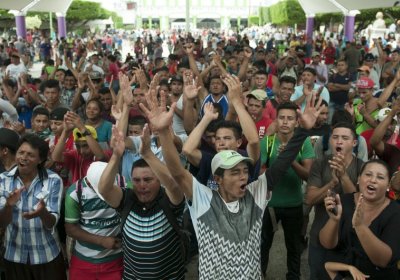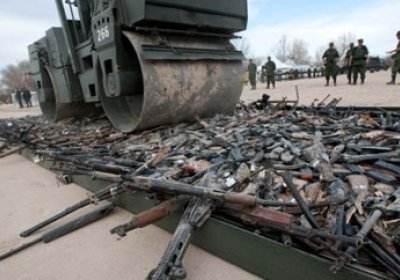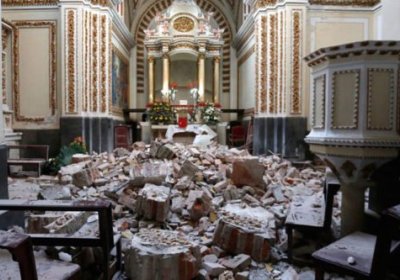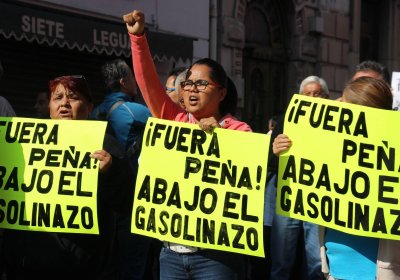Circulating intimate images — real or fake — over the internet to attack a woman's credibility, shame her or silence her, is one of the various types of online violence against women that the Mexican government will likely formalise as a crime in coming months, writes Tamara Pearson from Puebla.
Puebla
The United States is continuing to muscle the governments of Mexico, Honduras and Guatemala to stop the flow of refugees across its border.
Many migrants are fleeing the consequences of US political intervention and economic policy in the region. They choose to travel in “caravans” for safety.
Immigration officers have gone on the offensive against the caravans, writes Tamara Pearson.
This year has been the most violent year on record for Mexico, with almost 26,000 intentional homicides between January and September.
In many regions of the world, water is becoming a scarce commodity that is bought, sold and fought over.
The cabinet picked by Mexican President-elect Andres Manuel Lopez Obrador (AMLO) is the most progressive in generations, despite some dubious choices, writes Ryan Mallett-Outtrim from Puebla.
Mexico’s first left-wing president in decades is one month away from taking office, though his cabinet picks — half of whom are women — remain a mixed bag for progressives. On one hand, AMLO supporters have welcomed selections like Olga Sanchez Cordero, the incoming interior minister who supports legalising abortion and recreational marijuana.
United States President Donald Trump has resorted to racist comments and extreme measures in response to a procession of refugees and migrants heading towards the US.
In mid-October, thousands of Hondurans left for a journey of many weeks through Guatemala and Mexico to the US. At its peak, the procession of refugees and migrants has included more than 7000 people fleeing unemployment, poverty and gang violence.
Mexico’s next president, Andres Manuel Lopez Obrador (AMLO for short) is still three months away from taking office, but some of his campaign trail promises already seem distant, writes Ryan Mallett-Outtrim from Puebla.
Back in July, AMLO became the first left-wing candidate in Mexico’s modern history to win a presidential election, though he has to wait until December 1 to take office.
Mexico’s left-wing Morena movement stormed the presidency and appeared poised to flood both houses of congress, despite an election marred by violence and allegations of irregularities.
While many in Mexico are distracted by World Cup matches and the upcoming presidential elections, something big and strange has been going on under the radar.
I live next door to the world’s largest gun manufacturer. Here in Mexico, the murder rates are close to civil war levels.
The earthquake that hit on September 19 made my whole apartment move from side to side, like a tiny old ship caught on reckless waves. I live in the old part of central Puebla, just 51 kilometres from the epicentre.
After the quake, I watched as crowds gathered in the middle of the street — normally a busy fish and vegetable market. Children were crying, people were a bit shaken, but they seemed okay. The next morning, I walked around the city, observing the large cracks and broken corners on some of the most historic and beautiful buildings.
New Year’s Day is usually a moment of peace in the chaos of Mexico City — but not this year. For Mexicans, 2017 began with nationwide protests against the government’s plans to deregulate petrol prices, a move opponents say will hurt everyone from the poor to middle class.
Since January 1, protests have only continued to spread, with almost daily demonstrations in nearly every large city. Major highways have also been blockaded by furious transport workers, who say they can’t keep up with rising prices at the bowser.
- Previous page
- Page 3










